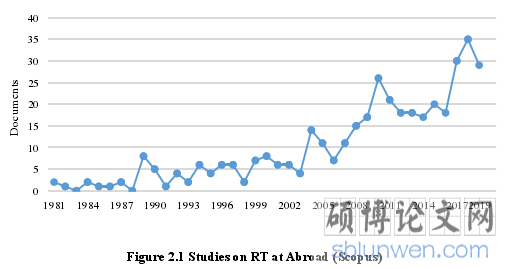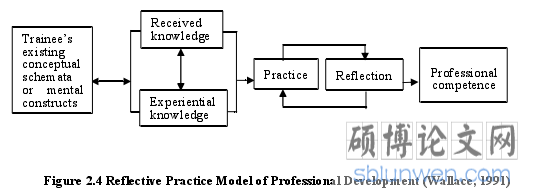Chapter One Introduction
1.1 Background of the study
Currently, with the implementation of the new round of basic education reform and the development of the curriculum reform in China. Teacher training has begun to shift from the simple discussion of pedagogical methods and the construction of instructional theories to the research on the professional development of lecturers. In recent years, reflective teaching (RT) has gradually attracted considerable attention in educational circles and becomes a hot issue in teacher education research. As an effective way, RT plays a vital role in the promotion of teachers’ professional development.
In 2010, Medium- and Long-term Educational Reform and Development Program (2010-2020) indicates that teachers’ professional competence is closely related to the quality of education. However, at present, it is evident that our country will almost certainly lack a considerable amount of foreign language teachers, especially high-quality and professional teachers. Besides, it seems likely that quite a few pre-service or in-service foreign language teachers could not connect and balance the theory and practice, and they could not adapt well to the changeable environment as well. Therefore, the improvement of foreign language teachers’ quality is not to be at one stroke, which requires teachers to adhere to lifelong learning and pursue sustained development.
Consequently, it is conceivable that the success of the foreign language teaching reform in the 21st century, to a large extent, is decided by the levels of teachers’ professional quality. To be more precise, the process of teachers’ persistent exploration, practice, and reflection on their teaching practice is crucial to the reform of education. Reflective teaching, as a vital connection in this process, can effectively link pedagogical theories and practice to promote lecturers’ professional development. It can be seen that introducing RT into foreign language teaching lessons is treated as an available way to boost the teaching quality of instructors.
........................
1.2 Purpose of the Study
This research investigates the perceptions of reflective teaching (RT) between novice and expert English teachers in English teaching practice through a questionnaire. Then, based on the data analysis of the questionnaire, the interview designed to supplement the explanation of the questionnaire. As regards the argument and discussion, this paper reports a study on finding out the differences between novice and expert English teachers in the perceptions of their reflective teaching practice. Furthermore, the enlightenment to middle school English teachers’ RT is also implied in the present study.
The ultimate aim of this study is not only to help middle school English teachers to shake off the traditional understanding but also to guide them to implement RT in an effective way. Furthermore, another purpose of this study is to improve the quality of English teaching in middle schools and achieve teachers’ professional growth and development.

.........................
Chapter Two Literature Review
2.1 Novice and Expert Teachers
2.1.1 Definition of Novice and Expert Teachers
As is indicated in the previous research, the development of teachers has different stages. This study set out to investigate two types of teachers: novice teachers and expert teachers.
On the one hand, overseas scholars are disposed to define the novice and expert teachers from the perspectives of knowledge structure, experience accumulation and cognitive skills. As Bereitier and Scardamalia (1993) defined, expert teachers generally qualify profound knowledge, relevant professional competence, and special expertise in teaching. Sternberg (1997) objectively analyzes the specific characteristics of expert teachers from three aspects, which are knowledge, efficiency, and insight. And he implied that expert teachers are usually qualitied with abundant professional knowledge, the ability to solve teaching problems flexibly and a strong sense of creativity. Besides, Brandt et al. (1986) distinguished NTs from ETs from the aspect of students’ performance and progress. For the most part, teachers’ working years, professional titles, and the ability of classroom management, and so on, are usually employed to distinguish the development stage of teachers.
On the other hand, overviewing the domestic relevant research, it is can be seen that academicians in our country are disposed to classify the expert and novice teachers according to teacher’s experience, professional title, and performance. In Guiding Opinions on Deepening the Reform of Professional Title System for Primary and Secondary School Teachers (2015), the professional title is classified into third-grade teacher, second-grade teacher, first-grade teacher, and senior teacher, among which first-grade and senior teacher, in general, have been teaching for more than 5 years in a first-grade or senior teacher position as well as have obtained bachelor’s degree or above. Also, they tend to have capability to preside over and instruct teaching research and make profound contributions in the domain of the specific subject. Tian (2003) claimed that the backbone teachers have worked for about 10 years and have achieved outstanding practical accomplishment are expert teachers, while teachers who have just entered the teaching team and lack sufficient teaching experience are novice teachers.
........................
2.2 Reflective Teaching (RT)
Reflective teaching or reflective instruction usually refers to a process that could facilitate teachers’ self-evaluation and professional growth.
In most cases, people are disposed to confuse “teacher reflection” and “reflective teaching”. Teacher reflection is just a kind of reflection which is regarded as a relatively static process that teachers just give consideration to their daily teaching practice before, during and after a lesson. Besides, it is also an approach for teachers to reflect on their teaching process. Whereas, RT refers to a teaching strategy based on the teacher’s reflection. To be more precise, with the assist of reflective teaching, teachers could evaluate what satisfied and unsatisfied in their daily teaching practice. Furthermore, gradually forming a systematical reflection pattern and style, and realizing the professional development. Therefore, it is necessary for teachers to know more about reflective teaching in a comprehensive and systematic way.
The following section elaborates RT in great detail, which includes the comparison between teacher reflection and reflective teaching, characteristics, types, content, approaches, and significance of RT.

...................................
3.1 Research Question ........................... 26
3.2 Research Participant .............................. 26
3.3 Research Instrument ................................ 27
Chapter Four Results and Discussion ........................................ 35
4.1 Results and Discussions of the Questionnaire ..................... 35
4.1.1 Awareness of Reflective Teaching .......................... 35
4.1.2 Content of Reflective Teaching ............................ 39
Chapter Five Conclusion ............ 69
5.1 Major Findings............................................. 67
5.2 Pedagogical Implications .................................. 69
Chapter Four Results and Discussion
4.1 Results and Discussions of the Questionnaire
To examine the status quo of English teachers’ reflective teaching in middle schools and lay a foundation for succeeding study, the questionnaire employed in this research is designed in line with Li and Xu’s study (2011) and Jin’s Reflective Teaching (2006). There are 125 middle school teachers participate in this investigation and their demographic information have been described in chapter four. Moreover, in the main body of the questionnaire, there are four aspects are embodied in the main body of the questionnaire: awareness, content, strategy and influencing factors of RT. In the following pages, the explanation and discussion of each aspect are pointed out in great detail.
4.1.1 Awareness of Reflective Teaching
The awareness of reflective teaching refers to a kind of intrinsic mental activity that reveals teachers’ intention of spontaneously conducting reflective instruction. In general, RT awareness relates to teachers’ attitudes towards reflection, such as their response to teaching problems, the tendency to read academic journals, etc.
In order to investigate specific circumstances of novice and expert English teachers’ reflective teaching awareness, there are ten items are designed, which are from Q1 to Q10 in the questionnaire according to Li and Xu’s scale of Chinese English teachers’ reflection. The detailed analysis is shown in the following part.
............................
Chapter Five Conclusion
5.1 Major Findings
The current study investigates novice and expert English teachers’ reflective teaching practice from the perspective of awareness, content, strategy, and influencing factors. To address the research questions, there are 125 middle school English teachers participate in the questionnaire survey and 8 of them are interviewed. Depending on the discussion and results of the questionnaire and interview, the major findings are shown in the following section.
Firstly, in the case of the awareness of reflective teaching, it is evident that regardless of novice or expert English teachers has a strong sense of conducting reflective teaching. In addition, the difference between novice and expert teachers in reflective teaching’ awareness is not statistically significant. Besides, what is surprising is that all the novice and expert English teachers have a tendency to reflect on their imperfections in their daily teaching. A possible explanation for this might be that teachers’ professional development becomes more and more pivotal under the current circumstances, which encourages more teachers to realize the importance of reflective instruction. However, from the analysis of interview records, the majority of teachers participate in reflective teaching appear to be in an unconscious job but not the systematic way.
Secondly, with respect to teachers’ reflective teaching content, this study focuses on three specific aspects, which refers to teaching value, teaching practice, and teaching environment. Novice English teachers’ reflection on their teaching value and teaching environment significantly differ from expert teachers’. In contrast to novice teachers, expert teachers put more emphasis on reflecting on teaching value like the value of knowledge, the influence of moral example, and educational purpose in daily teaching life. According to the interview, expert English teachers occasionally reflect on schools’ efficiency and rationality in arranging schedules and curriculum. On the other hand, it seems likely that expert teachers less focus on the reflection of the teaching environment compared to novice teachers. Regarding novice English Teachers, multi-media instruments are generally employed to assist their daily teaching, which suggests that internet-based teaching patterns, such as flipped classroom appear to be more acceptable to novice teachers. Additionally, novice teachers could be more proficient in operating advanced technology, such as computers, iPad, and some software. Apart from this, there is no notable difference between novice and expert English teachers in the reflection of their teaching practice.
reference(omitted)
